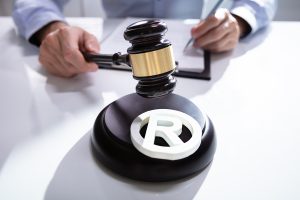 In Iancu v. Brunetti, the Supreme Court recently struck down the United States Patent and Trademark Office’s (USPTO) ban on scandalous trademarks for violating the First Amendment. This ruling is in accordance with the Court’s 2017 ruling in Matal v. Tam when it found that a registration for an Asian American band named The Slants should be allowed.
In Iancu v. Brunetti, the Supreme Court recently struck down the United States Patent and Trademark Office’s (USPTO) ban on scandalous trademarks for violating the First Amendment. This ruling is in accordance with the Court’s 2017 ruling in Matal v. Tam when it found that a registration for an Asian American band named The Slants should be allowed.
In a victory for First Amendment advocates, the Supreme Court recently held in Iancu v. Brunetti that the USPTO’s ban on registering “scandalous” marks was unconstitutional. The First Amendment is broad in the scope of protection that it provides. It explicitly states that “congress shall make no law prohibiting the freedom of speech or of the press.” But, the USPTO, a government entity, had been maintaining a ban on registering marks that it considered scandalous.
As enforced, the USPTO refused to approve applications that they determined to be too lewd and profane. This resulted in tension between the scope of the protections provided by the First Amendment and the USPTO’s scandalous marks ban.
What Happened During Iancu v. Brunetti?
In Iancu v. Brunetti, a graffiti artist/clothing company owner, Erik Brunetti, owned an apparel company called Fuct. Like a typical business owner, Brunetti attempted to register his company’s name with the USPTO in connection with a variety of clothing goods.
The USPTO rejected his application on the grounds that the phonetically profane term was too scandalous. In response, Brunetti argued that his mark was an arbitrary made-up word. The USPTO Examiner countered that it was too similar to the common curse word “fucked.” The USPTO continuously rejected the application after multiple rounds of arguments were submitted.
Before the Supreme Court’s ruling, the United States Court of Appeals for the Federal Circuit ruled in Brunetti’s favor. The court struck down the scandalous marks provision and allowed his application to be registered. The Federal Circuit’s ruling set the stage for the Supreme Court to take the case and progress the thought process that had already been outlined in Tam.
Process Outlined in Matal v. Tam
The Supreme Court began its analysis by revisiting Tam. In Tam, the Court concluded that the ban on disparaging marks amounted to viewpoint discrimination by the USPTO. Specifically, the Court restated the fundamental principle that the “government may not discriminate against speech based on the ideas or opinions it conveys.”
By refusing to register the mark in Tam, the government was expressing its disapproval of what it perceived to be the message being conveyed by the mark at issue. This amounted to viewpoint discrimination.
Similarly, by refusing registration of Brunetti’s mark, the USPTO was disapproving of what it perceived to be the message that was conveyed by Brunetti’s mark. Thus, the ban by the USPTO on the registration of Brunetti’s mark amounted to the government discriminating against “ideas that offend.”
Conclusion of Iancu v. Brunetti
For the USPTO’s ban on scandalous marks to survive, the ban must be found to be viewpoint neutral. During its analysis, the Court provided several examples of approved and rejected marks that had been approved and marks that were very similar in subject matter that had been rejected because it appears that the marks expressed a different viewpoint than the marks that were approved.
The government argued that those examples were simply mistakes. They claimed the statutory language that provided the impetus for the government to deny scandalous marks could still be upheld if it was read to bar marks that were offensive or shocking to a substantial segment of the public. According to the government, this reading would amount to the government being viewpoint neutral.
However, the Court rejected this interpretation and determined that to adopt the government’s interpretation would require the Court to rewrite the statute to say something that it does not say. Accordingly, the statute in question, as found in the Lanham Act, violated the First Amendment because it allowed for viewpoint discrimination.
Do You Have Questions About Trademarks?
To learn more about the what can and cannot be trademarked, please contact one of the Dallas trademark attorneys at Carstens, Allen & Gourley, LLP. You can call us at 972-367-2001 or contact us online.

